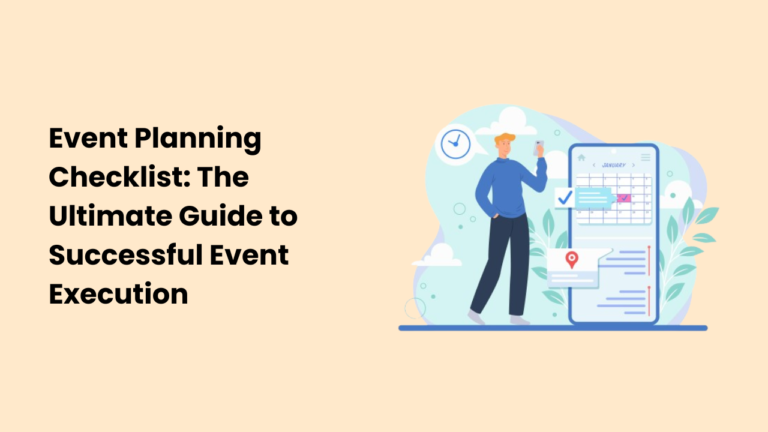Event planning is a comprehensive process of conceptualizing, organizing, and executing gatherings that range from small corporate meetings to large-scale conferences, weddings, and festivals. It involves intricate coordination, strategic thinking, and meticulous attention to detail to create memorable experiences that meet specific objectives and exceed participant expectations.
Components of Event Planning
Event planning encompasses multiple critical components:
- Strategic conceptualization
- Logistical management
- Budget allocation
- Venue selection
- Marketing and promotion
- Technology integration
- Participant experience design
- Risk management
- Post-event evaluation
50-Step Event Planning Comprehensive Checklist
Here are 50 steps to consider while doing event planning, divided into various categories.
Pre-Planning Phase
- Define Event Objectives: Clearly articulate the purpose, goals, and desired outcomes of your event.
- Identify Target Audience: Understand the demographic, professional, and personal characteristics of potential attendees.
- Establish Initial Budget: Create a comprehensive financial framework considering all potential expenses and revenue streams.
- Select Event Type: Determine whether it’s a conference, workshop, seminar, gala, or networking event.
- Conduct Market Research: analyze similar events, competitor strategies, and potential attendee preferences.
Strategic Planning
- Create a Detailed Timeline: Develop a comprehensive schedule with milestone dates and critical checkpoints.
- Form an Event Planning Team: Assemble skilled professionals with complementary expertise and clear responsibilities.
- Develop Event Concept: Design a unique value proposition that differentiates your event from others.
- Set Preliminary Budget Allocations: Break downthe budget into specific categories like venue, marketing, technology, and contingencies.
- Establish Key Performance Indicators (KPIs): Define measurable metrics to evaluate event success.
Venue and Logistics
- Research Potential Venues: Evaluate locations based on capacity, accessibility, amenities, and alignment with event goals.
- Conduct Site Visits: Physically inspect potential venues to assess suitability and infrastructure.
- Negotiate Venue Contract: Secure favourable terms, including pricing, cancellation policies, and included services.
- Plan Venue Layout: Design strategic space utilization for maximum attendee engagement and comfort.
- Arrange Technical Infrastructure: Ensure robust Wi-Fi, audiovisual equipment, and technological support systems.
Technology Integration
- Select Mobile Event App: Choose a user-friendly mobile event app offering event registration, networking, and real-time communication features.
- Implement Online Registration System: Create a seamless, intuitive registration process with multiple payment options.
- Design Digital Marketing Strategy: Develop targeted online campaigns across social media and professional networks.
- Set Up Event Website; Create an informative, responsive website with clear event details and a registration portal.
- Integrate Analytics Tools: Implement tracking mechanisms to monitor registrations, engagement, and marketing effectiveness.
Marketing and Promotion
- Develop a Comprehensive Marketing Plan: Create a multi-channel promotional strategy targeting specific audience segments.
- Design Event Branding: Develop consistent visual identity across all communication materials.
- Create Promotional Content: Produce engaging videos, graphics, and written materials highlighting event value.
- Launch Email Marketing Campaign: Develop segmented email sequences to drive registrations and maintain interest.
- Leverage Social Media Channels: Utilize platforms like LinkedIn, Twitter, and Instagram for targeted promotions.
Vendor and Speaker Management
- Identify and Invite Speakers Curate high-quality, relevant speakers aligned with the event theme and objectives.
- Negotiate Speaker Contracts Establish clear expectations, compensation, and logistical support.
- Select Event Vendors Choose reliable partners for catering, audio-visual, decoration, and other services.
- Coordinate Vendor Logistics Develop comprehensive briefing documents and conduct planning meetings.
- Create Vendor Payment Schedule Establish clear financial terms and milestone-based payment structures.
Participant Experience
- Design Registration Process Create a streamlined, user-friendly event registration workflow with minimal friction.
- Develop Onsite Event Solutions Implement efficient event check-in processes, onsite badge printing, and real-time support systems.
- Plan Networking Opportunities Design structured and informal networking sessions to encourage interactions.
- Create Attendee Communication Plan Develop pre-event, during-event, and post-event communication strategies.
- Arrange Accommodation Options Secure hotel room blocks and provide travel recommendations for out-of-town participants.
Financial Management
- Develop Detailed Budget Tracking: Monitor expenses in real-time and maintain financial discipline.
- Explore Sponsorship Opportunities: Identify and engage potential corporate and industry sponsors.
- Establish Pricing Strategy: Design tiered pricing models with early bird, group, and standard registration rates.
- Implement Secure Payment Gateways: Integrate multiple, reliable payment methods with robust security protocols.
- Create Financial Contingency Plan Develop backup strategies for unexpected expenses or revenue shortfalls.
Operational Preparation
- Conduct Comprehensive Rehearsals: Practice event flow, technical transitions, and emergency protocols.
- Develop Detailed Run-of-Show Document: Create a minute-by-minute event schedule with specific responsibilities.
- Train Event Staff: Conduct thorough training sessions covering customer service and problem-solving.
- Prepare Emergency Response: Plan Design protocols for medical, security, and unexpected scenario management.
- Create Backup Technology Solutions: Ensure redundant systems for critical technological infrastructure.
Post-Event Activities
- Design Feedback Mechanism: Develop comprehensive survey tools to capture attendee insights.
- Conduct Detailed Performance Analysis: Evaluate events against predefined KPIs and objectives.
- Generate Comprehensive Report: Produce detailed documentation of event outcomes, learnings, and recommendations.
- Follow-up Communication: Send personalized thank-you messages and future engagement opportunities.
- Financial Reconciliation: Complete final financial settlements and conduct a thorough expense review.
Conclusion
Successful event planning requires a holistic, strategic approach that balances creativity, technological integration, and meticulous execution. By following this comprehensive checklist, event planners can significantly enhance their ability to deliver exceptional, memorable experiences.
Remember, every event is unique, and while this checklist provides a robust framework, adaptability and continuous learning remain crucial to mastering the art of event planning.



